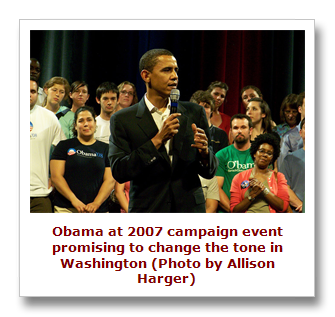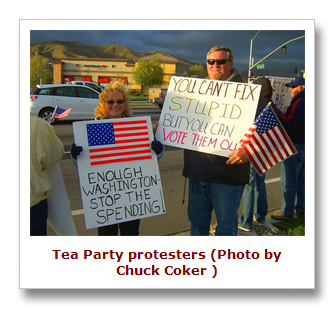Congress – the most unpopular institution in the U.S.
While running for president Barack Obama promised to change the tone in Washington; it certainly has changed, but not for the better. Right out of the gate Mr. Obama took the position that “we won…get used to it.” That kind of attitude only causes those on the other side of the aisle to dig in and so they did. Those in Mr. Obama’s party became arrogant and emboldened by large majorities in the House and Senate. Certainly the Democrats large majorities allowed them to have their way with the U.S. economy and it hasn’t been good, but with both sides so far apart, catering to their base, can any meaningful progress be possible?
Liberals have a tendency to vilify those whose views differ from their own, but it wasn’t always that way. During the Reagan administration Speaker of the House Tip O’Neill, a Democrat from Massachusetts had regular meetings with Mr. Reagan and they could discuss their differences without antagonism or venom. Reagan and O’Neill knew that moving legislation forward that benefitted the country meant at least respecting each other’s views. That doesn’t mean that they didn’t fight hard for the issues that mattered to them, but they did so without the need to paint their opponents as unfeeling monsters. It’s only been in the last decade that we’ve seen the rancor that’s forms the public’s view of Congress.
So what happened? Republican and Democrat views haven’t changed significantly in recent history. Much of the change can be traced to the Mediscare tactics employed by the upper-echelon of the Democratic National Committee and President Clinton during the 1996 presidential campaign. A seed change had occurred. The Republicans were not without culpability. The GOP’s handling of the Monica Lewinsky scandal, and the hard line against Clinton soured many Democrats and the divide widened.
Yet even after the Clinton impeachment and Mediscare, a modicum of respect remained. Much of the credit can be given to a few individuals who remembered the bipartisanship of the past. Robert Dole, even after the shellacking he took in the 1996 election remained a level head in Senate. As much as Newt Gingrich was labeled far-right, during his tenure as Speaker of the House he was able to work with Clinton and House Minority Leader Dick Gephardt (D) to produce one of the most productive congresses in history.
Pragmatists weren’t uncommon in Congress during the latter part of the 20th century: Democrats such as Bill Bradley of New Jersey and Chuck Robb of Virginia in the Senate and Mo Udall of Arizona and Lee Hamilton of Indiana in the House held strong beliefs but understood the necessity to moderate one’s views for the benefit of the country. Republican Senators John Warner and Al D’Amato respected their counterparts as did Democrat Senators Sam Nunn and John Glenn. Where have the practical legislators all gone?
It’s not overstated to say that the U.S. is a center-right country but it seems Congress is not in sync with the public. Something has driven the parties to the far extremes and there’s some evidence that the cause can be laid on 2 people: Nancy Pelosi and Harry Reid. Both Reid and Pelosi have strong left-wing beliefs. More power to them. No one asks someone to completely vacate their beliefs, but tone can destroy respect and both Pelosi and Reid took a shaky truce after the Clinton impeachment and Contract with America and shredded it.
Pelosi and Reid went after George W. Bush in a brutal and disrespectful way. Neither Reid nor Pelosi accepted Bush after the “hanging chads” fiasco of the 2000 election; for the first time in history we heard words about a president meant to belittle him and it inflamed his supporters. While calling Bush a liar and murderer might be treats for the most liberal wing of the Democrat Party, it was also fodder for their opponents. Mutual respect was replaced with loathing and partisanship and battle lines were drawn.
Obama’s first 2 years were replete with “we’re going to do what we want and there’s nothing you can do about it.” As the Republicans retreated to their corner and the Democrats plowed through their legislation, the country became disenchanted with a single-minded approach to governing and led to the birth of the Tea Party. Everyday American’s began to assess their government and realize their representatives had squandered trillions of dollars to further their own political views and endear themselves to their donors. Democratic moderates were destroyed in the 2010 election leaving behind only the most liberal wing of the Democratic Caucus.
Conservatives and Liberals used to be able to converse without disrespect or hostility. Everyone could hold on to their beliefs and yet hear the other side without resorting to name calling or demagoguery. Sadly, those days are gone. The well is poisoned and new blood is necessary to purge the disease.
Every 30 days we shed the outer layers of our skin to allow for new skin to emerge; perhaps a little shedding is warranted in Washington. Term limits make sure that the political slaves in Congress, beholden to the special interests that fund their re-election campaigns, cannot endlessly answer to their masters. Our Congress is imprisoned by their base leaving little room for moderation.
Democrats blame the Tea Party for the rise of conservatism in Congress when in fact it’s their own marriage to the most radical elements of the progressive movement that has bred a Republican drift to the right. Democratic Party leaders demonize the Tea Party as radical conservatives when it is, in fact, far from right-wing; nearly one-third of the Tea Party is comprised of Independents and another 20 percent are registered Democrats. Democrats that attack the Tea Party do so at their own peril. While painting the Tea Party as fundamentalist conservatives might buy a few votes, ultimately those who care to investigate learn that the Tea Party is focused on government excesses and not ideology. Resorting to calling Tea Party members racists or blaming them for the negative discourse in Washington does nothing to repair the economy or move us forward.
Ronald Reagan famously said, “The person who agrees with you 80 percent of the time is a friend and an ally – not a 20 percent traitor.” While we’d all like to “have it our way,” 80 percent goes a lot further than 0 percent. Unfortunately we find ourselves victims of an all-or-nothing government fueled by partisans and a man who promised moderation while practicing the opposite.


